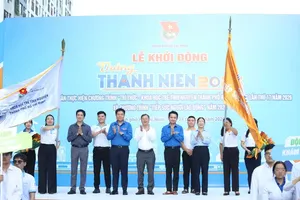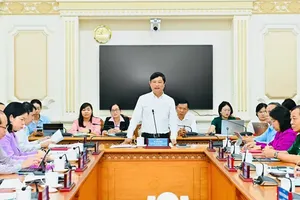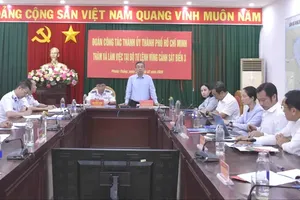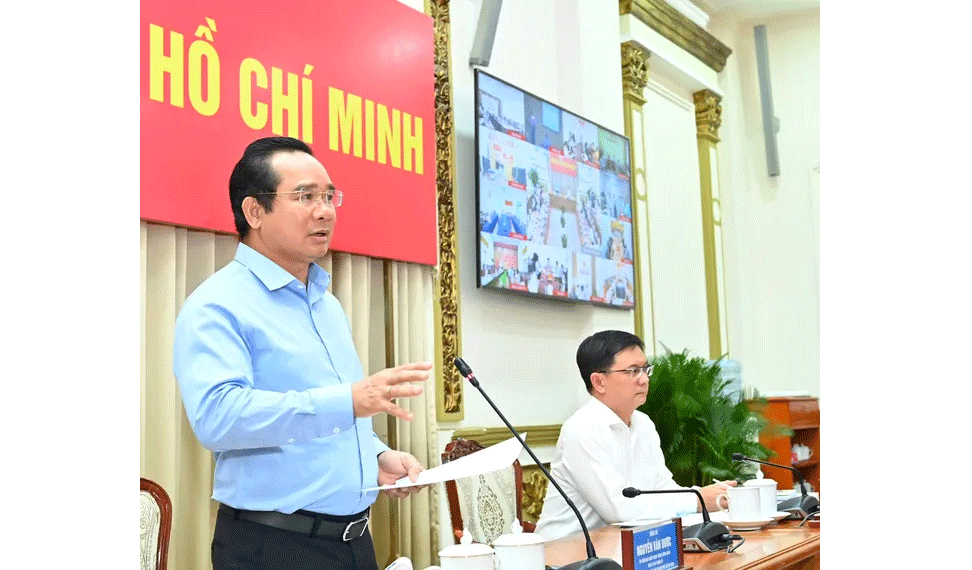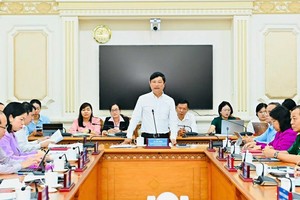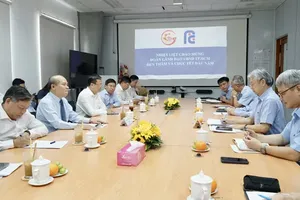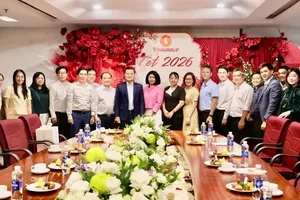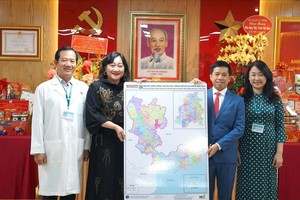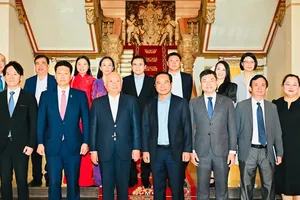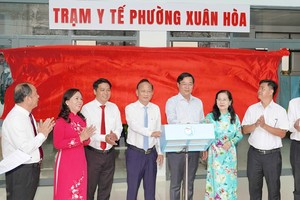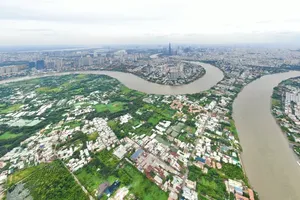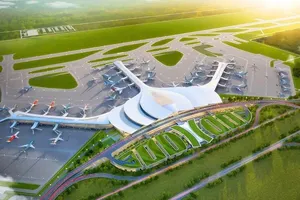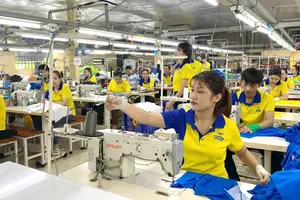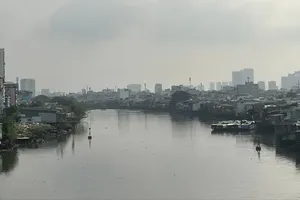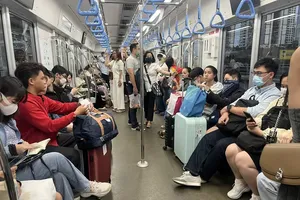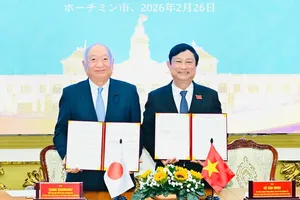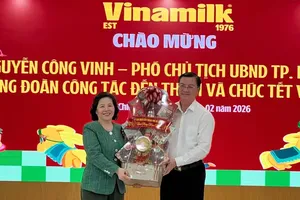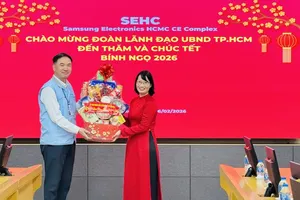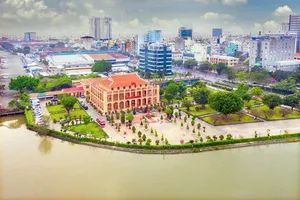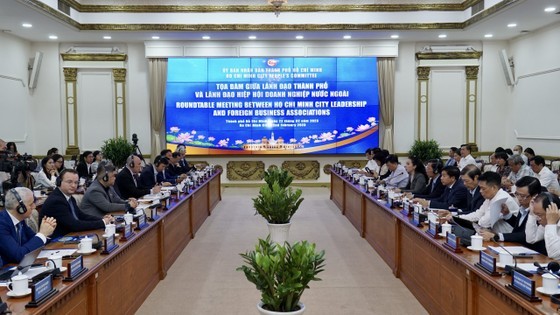 |
The scene of the dialogue. (Photo: SGGP) |
The event had the attendance of Mr. Phan Van Mai, Member of the Party Central Committee, Standing Deputy Secretary of the City Party Committee, Chairman of the People's Committee of HCMC, 25 leaders of departments and agencies, and city-based foreign business associations.
Mr. Dao Minh Chanh, Deputy Director of the Department of Planning and Investment, reported that the goal by 2025 of HCMC is to be a modern, smart, service and industrial-oriented city, maintaining its role as the economic locomotive with a per capita GRDP reaching US$8,500. To achieve this goal, HCMC has proposed five solutions.
The first solution is to develop the economy rapidly and sustainably by innovating the growth model, restructuring the economy, improving productivity, quality, efficiency, and international competitiveness, and effectively mobilizing and using all resources. The city plans to transform its hi-tech parks, industrial parks, and export processing zones into centers for high technology, creativity, digital economy, green economy, and circular economy and concentrate on high value-added products and stages that can join regional and global value chains.
The second solution is to focus on the synchronous development of economic sectors, strongly promoting the private economic sector, building large enterprises with national and global brands, and attracting investment in industries and fields that can contribute positively to the process of restructuring the economy towards sustainability, greenness, intelligence, modernity, innovation, and high value-added, with the ability to spread widely and create linkage, leading to the development of city-based enterprises.
The city plans to attract large corporations and enterprises to establish innovative centers and research and development centers headquartered in the city and develop digital platforms to connect city-based enterprises with foreign direct investment (FDI) enterprises.
The third solution is to promote its role as a driving force and leader of public investment, combining capital sources from the private sector, foreign investment, sponsors, and international financial institutions. The city plans to develop Thu Duc city into a new growth pole, a creative and highly interactive city, and a nucleus promoting the city's socio-economic development based on a knowledge-based economy, the application of science and technology, and high labor productivity.
The fourth solution is to improve the quality of planning, management, and implementation, develop urban sustainability, adapt to climate change, and promote the construction of synchronous and modern infrastructure. The city gives priority to investment in developing a modern and integrated transport, energy, and telecommunications infrastructure system, in conjunction with the transport infrastructure development project for the 2020-2030 period.
Specifically, the city will complete the construction of national highways and the system of inter-regional and inter-district connecting roads according to the established plans, which include completing and putting into operation the urban railway line No.1 by 2024, completing Ring Road No.3 by 2026 and Ring Road No.4 (the section from the bridge over the Saigon River to the Thay Cai Canal) by 2030. In addition, the city will also invest in the HCMC-Moc Bai Expressway and the HCMC-Chon Thanh Expressway, among other projects.
The city will cooperate with the Ministry of Transport in expanding Tan Son Nhat International Airport, upgrading and expanding the system of highways and national highways of HCMC - Trung Luong, HCMC - Long Thanh - Dau Giay, the connecting roads of Long Thanh International Airport (National Highway 20B), investing in building an urban railway connecting HCMC with Binh Duong and Dong Nai provinces, Thu Thiem - Long Thanh railway, and HCMC - Can Tho railway.
Moreover, the city will complete the coastal route of HCMC, renovate inland waterway routes to meet technical standards, and promote investment in the construction of Can Gio International Transshipment Port. Finally, the city will continue to invest in a high-capacity public transport system and effectively operate the urban railway network, marine navigation channels, and waterways to ensure a seamless connection with provinces in the Southeast region, the Mekong River Delta, the South Central Coast, and the Central Highlands.
The fifth solution is to strongly emphasize the development of culture, society, education and training, healthcare, and the improvement of people's quality of life, aiming to build a civilized, modern, and compassionate city. The city will restructure its overall economy, putting it in the relationship with the region, the entire country, and the world, and associate it with the innovation of the growth model.
Finally, the city aims to ensure national defense and security, improve the efficiency of foreign affairs and international integration, and actively grasp opportunities from free trade agreements (FTAs) that Vietnam participates in, especially new-generation FTAs.
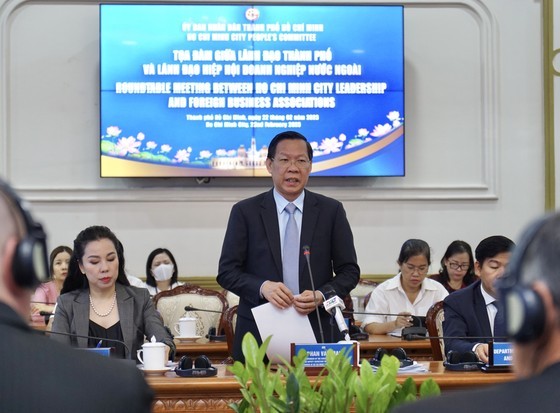 |
Mr. Phan Van Mai, Chairman of the HCMC People's Committee, speaks at the meeting. (Photo: SGGP) |
Speaking at the seminar, Mr. Phan Van Mai, Chairman of the HCMC People's Committee, said that the city recognizes the significant contribution of the business community to the goals that the city achieved in 2022. However, the city wishes to listen to the opinions of enterprises on city development.
The Chairman of the People's Committee of HCMC stated that the actual engagement of businesses with both domestic and foreign partners would be a practical contribution towards the correction of inadequacies in management activities and would create motivation for the city's future development. The city is willing to listen and immediately address any issues enterprises encounter.
If the matter requires participation in the interdisciplinary resolution, it will be resolved and responded to within one month. Besides, the city welcomes foreign investors and creates a favorable business environment by providing land and human resources. From now until 2025, the city will announce investment opportunities and preferential policies to attract foreign enterprises.
At the dialogue between HCMC leaders and foreign business associations, Mr. James Ollen, Executive Director of the American Chamber of Commerce in Vietnam (AmCham) - HCMC & Da Nang, sent eight recommendations to the city.
Firstly, the city needs to improve its investment environment, which can be achieved by adopting digital transformation in public management activities to create a fair, transparent legal environment and a fast, reliable, and consistent approval process. To facilitate the expansion of US business investments, the association recommends that the city allow AmCham member companies to expand their existing investments.
To enhance the capacity of city-based enterprises to participate deeply in the global supply chain, Vietnam, in general, and HCMC, in particular, need to have tax policies compatible with global tax policies. Vietnam should adopt global standards on accounting, auditing, and transfer pricing and use the pre-agreement process on tax calculation methods approved by the National Assembly.
Secondly, the city needs to improve environmental quality, especially air quality and noise pollution. Additionally, the city should invest in creating more pedestrian lanes and improving public transportation infrastructure. AmCham member companies also hope to have opportunities to participate in high-quality healthcare and promote the health and well-being of citizens, including the opportunities to develop the city into a medical tourism destination.
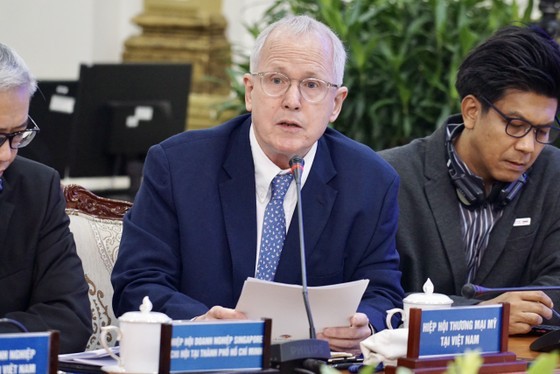 |
Mr. James Ollen, Executive Director of American Chamber of Commerce in Vietnam - HCMC & Da Nang. (Photo: SGGP) |
Thirdly, regarding the issue of supporting the city to develop supply chains and high-value production, AmCham suggested that the city reform education, adopt policies to promote supply chain localization and invest in transport and logistics infrastructure. Furthermore, the city should develop essential action solutions to meet energy security and clean energy transition, encourage increased investment in high technology, and improve research and development capacity.
Fourth, the city needs a solution to invest in transportation infrastructure to facilitate sustainable growth. Transportation infrastructure is a significant bottleneck, particularly for manufacturing and tourism. Traffic congestion in and around the city has a detrimental impact on business operations and quality of life. AmCham members appreciate investment plans that enhance transportation infrastructure in the Southern region.
However, these plans must be implemented and accelerated as part of the overall Southern supply chain corridor to promote connectivity among economic zones. From Binh Duong and Dong Nai in the North to Ba Ria Vung Tau in the South, industrial parks must be easily accessible via non-congested highways to the new Long Thanh Airport, Cat Lai Port, and Cai Mep Logistics Center. It is essential to alleviate HCMC's traffic congestion and create an opportunity to increase industrial output across the South.
Fifth, HCMC has immense potential to become a leader in digital economic services. Therefore, promoting investment in digital transformation is critical to establish a foundation for attracting innovative and creative technology startups to the city, thereby accelerating the economic development process.
The sixth is to form centers and training bases to develop a globally competitive workforce. AmCham is committed to working with the Vietnamese government, educational institutions, the World Bank, and the private sector to address the skills gap and increase worker productivity. The AmCham encourages regulatory review to support digitization and improve access to education.
The seventh is to reform the capital market to promote investment. The city must soon build and put into operation a regional financial center and an international financial center in the future.
The eighth is to simplify visa policy to boost the economy. Vietnam must have a clear, consistent, and accommodating policy that allows eligible foreign directors, managers, and experts to apply for a work permit in Vietnam or travel to Vietnam for business purposes. It will encourage investment in the country and promote economic development.
